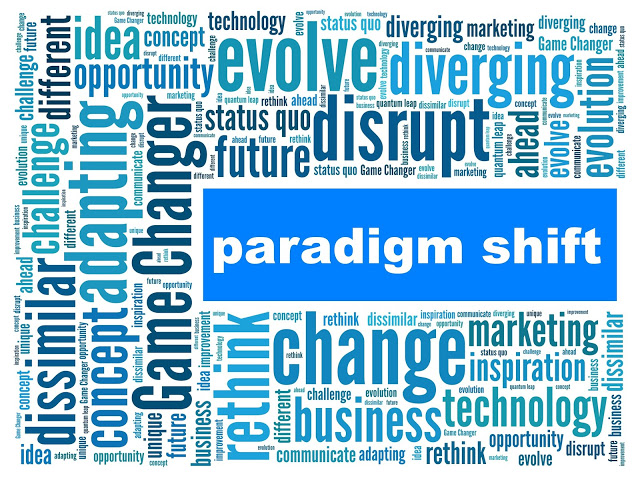Erica: "It's our job to study the future on a continual basis. I'm looking at social trends, economic, technological, demographic, environmental, you name it. How all of these things intersect and then extrapolating out to what the strategic opportunities and strategic threats are for people."
"Seeing it through new eyes ' we get so trapped in our thinking that oftentimes we act with blinders on, we accumulate knowledge based on what we know and we think it makes us able to see disruptive things happening on the horizon differently. But it also impedes us from seeing new disruptive trends. It's my job to open peoples' eyes get them thinking differently. See how all of these things interact and intersect and influence the future of pretty much every industry across the board."
Dan: "Future Hunters has an allure or a mystery to it. You claim your process is time tested and you don't follow fads. What goes into your process?"
Erica: "(You need to) understand the bidirectional relationship between the counter trend and the trend.
Often we think the counter trend happens in spite of the trend, but the counter trend happens because of the trend. We see the growth of the virtual, tech is intermediating the human. The counter trend is the desire to reestablish true, genuine human engagement where you don't have technology as an intermediary. This counter trend is not happening in spite but because of it.
In design and branding space we see many companies adopting virtual or augmented reality platforms, at the same time they're looking for the human touchpoint promoting empathy or cultural sensitivity. Things people are resonating with people on a more visceral level."
Dan: "Today's brands are on the spot to engage customers."
Erica: "The evolution of storytelling is profound. Consumers are getting in on the process and sharing their experiences with the brand, it's very consumer centric."
Erica: "Making that determination is based on a value judgment. I go back to - seeing the future with a new set of eyes means stripping away all those inherent value judgments; this is the hardest part of my job. It's human nature to attach some sort of view point on whether this is an exciting development or scary develpment vs. just seeing it for what it is. Underlying much of what is happening... whether it's tech progress or the future of empathy on the more human end of the spectrum...What's tying this all together is just reframing and reunderstanding time in a completely new way. Brands are playing a game of catch up with this. When you couple the exponential rate of technological change with what's happening from a time perspective. Time is just getting faster and faster. It's going from something we once viewed as linear and sequential' now it's happening simultaneously. So we can live many lives at once, whether it's in the real world and virtual reality, we can be many different personas. From a design and also from a marketing and advertising perspective the consumer of today is so much more multifaceted. Getting to the heart of what makes them tick when they're one person one day and another person the next becomes really difficult. Time in the years to come is only going to become even faster."
Dan: "If time is speeding up, I am seeing brands having to be more and more authentic and honest. Do you think at some point will the brands just say well 'we're a lot more human, we're a lot less perfect'."
Erica: "When we look at 'cybrids'' those under the age of 18, especially those under age of 10, they're the 1st generation in history to have different neural wiring than the generations that preceded them. This is caused by access and exposure to technology at such a young age that it is literally rewiring their brains and their neural connections. They're the 1st generation in history to have a truly symbiotic relationship with technology. This symbiosis with technology is changing their perceptions, cognition, purchasing decisions, buying habits and how they learn. For a lot of brands being able to attach something from a design perspective directly to their brains - and a changed brain is going to be critical'When we have a changed brain structure, really understanding what makes them tick will be critical. At the same time, it's the generation that also is craving the other end of the spectrum, that face to face interaction. How to effectively marry the two is the million dollar question in the years to come. .. Who knows how these brain differences are going to manifest as they go into the workplace. There are things they are going to be hyper proficient at' in other ways, keeping them engaged and interested - present - will be interesting."
Dan: "Anything particularly inspiring in design trends around the world?"
Erica: "4D printing. In 50 years, go into an IKEA store. Right now you take home a box with 100 pieces, you have to put them together. Imagine being able to 3D print out all those separate pieces at home, they are infused with smart nanobots that know how to assemble themselves. That's what researchers at MIT are looking at.
Dan: "I could geek out on this all day. From a top level perspective, what does the best brand strategy look like in 10 years. Can you tell me what brands will be most powerful in 2026?"
Erica: "I can't. I would argue that the brands that will be the most powerful in 2026 don't exist yet. If you asked me this 10 years ago, many of the companies that I would answer today either were not in existence or 'were in a different form. I go back to this whole notion of time, when things speed up so quickly, and so many of these cycles are so unpredictable. I would say the major disruptor are companies that are probably going to be owned and created by cybrids.
Dan: "From talking to you Erica, I can safely say the cybrids are going to take over the earth."
Erica: "For the near future until those younger than them take over!"
You can listen to the full podcast here, or continue picking Erica's brain about cybrids and 4D printing at @erorange.


